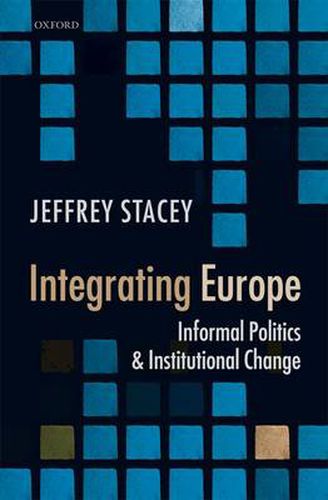Readings Newsletter
Become a Readings Member to make your shopping experience even easier.
Sign in or sign up for free!
You’re not far away from qualifying for FREE standard shipping within Australia
You’ve qualified for FREE standard shipping within Australia
The cart is loading…






In Integrating Europe: Informal Politics and Institutional Change the author explains why the European Union (EU) member states actively surrender policy-making power to supranational authorities in unconventional ways. In light of the general antipathy toward giving up national sovereignty in European societies-even where pro-European sentiment thrives, why do national governments allow the creation of any new EU laws or policies whose effects they cannot keep under their general control? Why do EU member states allow any sovereignty transfer to occur outside of inter-governmental treaties, which are the only legitimate EU bargains found in the EU’s formal sphere? Deploying the tools of rational choice institutionalist theory, the author argues that informal bargains struck between the EU’s primary organizational actors - the European Council, European Commission, and European Parliament - have paradoxically resulted in increased integration. As the EU is an ideal laboratory for testing different institutionalist hypotheses for explaining institutional change, the author focuses on the ongoing competition to alter the EU rules that allocate power, and, with an approach that allows for feedback loops among agents and structures, makes an argument that flies in the face of realist and intergovernmentalist theories. While some have shed light on the importance of informal dynamics in the legal sphere of the EU, this book does the same for the policy-making sphere.
$9.00 standard shipping within Australia
FREE standard shipping within Australia for orders over $100.00
Express & International shipping calculated at checkout
In Integrating Europe: Informal Politics and Institutional Change the author explains why the European Union (EU) member states actively surrender policy-making power to supranational authorities in unconventional ways. In light of the general antipathy toward giving up national sovereignty in European societies-even where pro-European sentiment thrives, why do national governments allow the creation of any new EU laws or policies whose effects they cannot keep under their general control? Why do EU member states allow any sovereignty transfer to occur outside of inter-governmental treaties, which are the only legitimate EU bargains found in the EU’s formal sphere? Deploying the tools of rational choice institutionalist theory, the author argues that informal bargains struck between the EU’s primary organizational actors - the European Council, European Commission, and European Parliament - have paradoxically resulted in increased integration. As the EU is an ideal laboratory for testing different institutionalist hypotheses for explaining institutional change, the author focuses on the ongoing competition to alter the EU rules that allocate power, and, with an approach that allows for feedback loops among agents and structures, makes an argument that flies in the face of realist and intergovernmentalist theories. While some have shed light on the importance of informal dynamics in the legal sphere of the EU, this book does the same for the policy-making sphere.